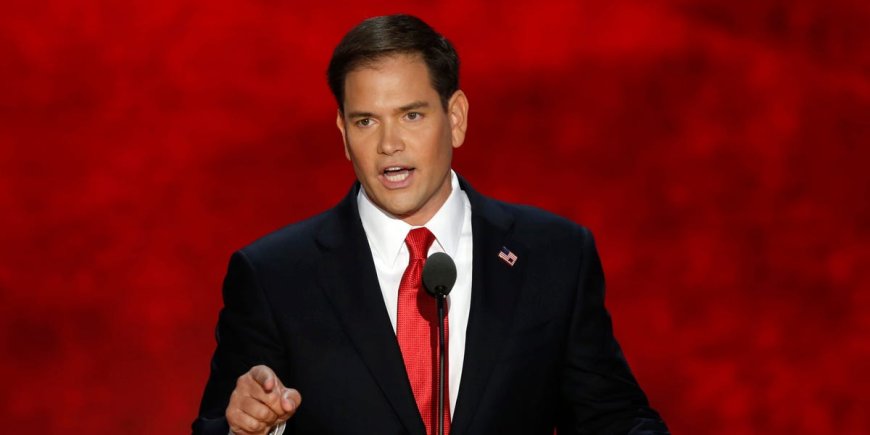What Marco Rubio's nomination as Trump's secretary of state means for China and Taiwan
The nomination of Rubio, a China hawk who's been sanctioned by Beijing, comes at a tense moment in the Indo-Pacific region.

REUTERS/Mike Segar
- Trump has officially announced Sen. Marco Rubio as his pick for secretary of state.
- Rubio is a China hawk, has been sanctioned twice by Beijing, and may even be barred from the country.
- Rubio has also introduced and supported legislation for US military support for Taiwan.
US President-elect Donald Trump has officially announced Sen. Marco Rubio as his secretary of state pick after days of speculation.
Nominating Rubio is especially notable for the Florida senator's thorny relationship with China and steadfast support of Taiwan, raising questions about what US-Chinese relations will look like if he's confirmed.
Earlier this week, sources close to Trump told The New York Times they were confident Rubio would be the president-elect's nomination. On Wednesday, Trump confirmed the pick, calling Rubio "a highly respected leader" who "will be a strong advocate for our nation, a true friend to our allies, and a fearless warrior who will never back down to our adversaries."
In a statement, Rubio said he was "honored" to receive the nomination. "Under the leadership of President Trump, we will deliver peace through strength and always put the interests of Americans and America above all else," the senator said.
When reached out to for comment, Rubio's Senate office directed Business Insider to his statement on the nomination. The Trump transition team and the Chinese embassy in Washington didn't immediately respond to Business Insider's request for comment on Wednesday. AP Photo/John Raoux
Since winning his senate seat in 2010, Rubio has been an outspoken critic of China. He's repeatedly spoken out about China's ambitious military and political goals, economic power, and the US' response to its growing influence.
And Beijing has taken note. In 2020, Rubio and other US Senators were sanctioned by Beijing. Rubio was sanctioned, or blacklisted, twice — first in retaliation for US measures against senior Chinese officials over the mass detainment and abuse of the Uyghur ethnic group, and the second after Rubio supported US sanctions against Chinese officials for their response to protests in Hong Kong. Rubio has accused China of a "grotesque campaign of genocide" against the Uyghurs.
The question now is whether China will lift the sanctions on Rubio, which may prohibit him from traveling to the country, and how Washington's relations with Beijing could be impacted if Rubio's confirmed. But China's actions haven't stopped Rubio from continuing to speak out.
At a 2022 talk with The Heritage Foundation, Rubio said members of the Chinese Communist Party had, for decades, "hid their true ambition to remake the global order and become the world's most powerful nation. But they don't hide it anymore."
Some experts and top China watchers have indicated that China's goals, along with those of Russia, Iran, and North Korea, are to upend the US-led liberal world order.
At the same talk, Rubio noted, "The gravest threat facing America today, the challenge that will define this century and every generation represented here, is not climate change, the pandemic, or the left's version of social justice. The threat that will define this century is China." Joe Raedle/Getty Images
He has expressed similar rhetoric in the past and since then, criticizing what he has said is growing and ongoing Chinese economic and political influence in the US. "They have leverage over our economy. They have influence over our society. They have an army of unpaid lobbyists here in Washington," Rubio said during a 2023 Senate speech. He also wrote an op-ed in September of this year in The Washington Post that Beijing's plans were meant to harm the US' economy.
Some of that aligns with Trump's tough talk on trade with China. During the campaign trail, Trump said he planned to slap major tariffs on China in an effort to boost American business.
Another looming question is what Rubio's nomination may mean for Taiwan. The Florida senator has long supported Taiwanese independence — a stance beyond the US government's long-standing One China approach — and introduced legislation to strengthen US-Taiwanese relations and increase military aid and support to Taipei in an effort to deter a potential Chinese invasion or blockade.
If Rubio is confirmed, his time as secretary of state will come at a tense time for the Indo-Pacific region, with US officials bracing for China to be ready to seize Taiwan by 2027.
What's Your Reaction?







































